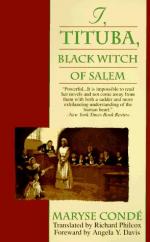|
This section contains 926 words (approx. 3 pages at 400 words per page) |

|
Oppression
This is the novel's primary thematic concern, an exploration of the many facets, manifestations and effects of oppression. The narrative includes examples of oppression based on race (white oppression of blacks), gender (male oppression of female) and faith (Christian oppression of non-Christian), all of which, in the book's essential perspective, are grounded in a desire for power and control as well as in narrow-minded judgment. There is the strong sense that the book's portrayals of individual suffering under such oppression (experienced most intensely by Tituba, Hester and Cohen, and to varying degrees by several other characters) are intended to be emblematic and/or metaphoric representations of the suffering undergone by the groups to which those individuals belong - again, non-whites, non-males, and non-Christians. In other words, the book is a portrayal not only of individual oppression, but of oppression of entire societies, cultures, and identities.
It's important to...
|
This section contains 926 words (approx. 3 pages at 400 words per page) |

|




